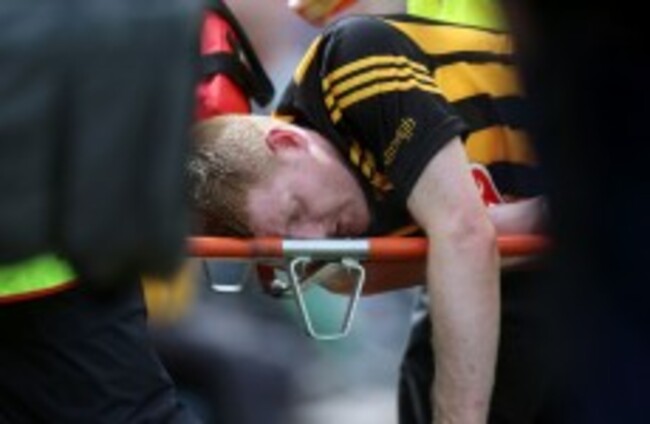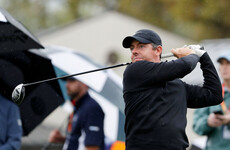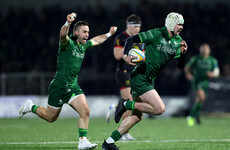ON SATURDAY NIGHT Donegal manager Jim McGuinness, still seething about the tackle which left Mark McHugh in hospital a week earlier, blasted the ‘dangerous’ levels of physicality in the GAA.
As well as a perforated eardrum and a torn quad muscle which places a major question mark over his fitness for tomorrow’s All-Ireland quarter-final, McHugh suffered a concussion.
His Donegal team-mates Declan Walsh, Ryan Bradley and Frank McGlynn have also been concussed since the start of the Championship while the day after McGuinness’s public service announcement, Kilkenny All-Star Richie Power was stretchered off with a similar injury in Thurles.
At a time when GAA players are bigger, faster and stronger than ever before, the consequences of high-impact collisions on the pitch cannot be ignored.
Under the Association’s strict protocols, drawn up in 2007, a player should not be allowed to continue playing if they show even one symptom of concussion. It is a much more stringent stance than is currently taken in rugby, where players can be allowed to return if they pass a five-minute assessment.
And yet in survey figures released by the Gaelic Players Association (GPA) and Acquired Brain Injury (ABI) Ireland last summer, 58% of inter-county players asked said that they had continued to play with a concussion while 42% said that they could not remember the remainder of the game.
At club and local level, the true figure could be even higher still.
“You see the size of these guys and the speed at which they’re able to move so it’s something that’s going to happen,” Karen O’Boyle, Communications Executive at ABI Ireland, told TheScore.ie this week. “We need to make sure that the players are aware and able to self-manage.
If they play on with a ligament injury they know the repercussions so we just need to get their knowledge of concussion to that same level so that they know when to sit out.
For the last two years, ABI Ireland has been working closely with both the GAA and the GPA to improve attitudes towards concussion within the sport. Dublin footballers Michael Darragh MacAuley and Rory O’Carroll fronted an awareness campaign last year while Tipperary hurler Noel McGrath, Armagh footballer Ciaran McKeever and Mayo footballer Conor Mortimer have also got on board.
“We realised that the education and awareness among players was really minor compared to what it should be,” O’Boyle explains, pointing out that the more attritional nature of sports like American football and rugby makes serious concussions easier to spot.
Galway’s Fergal Moore was deemed to have suffered a “slight concussion” in the National Hurling League semi-final (©INPHO/James Crombie)
“In the GAA, they’re much more inclined to get minor concussions which are not knockouts. The players take a hit to the head but it’s not a knockout and they’re not aware that they have a minor concussion so they get up and play on.
It’s the minor concussions where they think they’re able to play on, that’s where we need to increase awareness. We need to connect ‘I took a hit to the head, I’m feeling a bit nauseous’ with ‘that’s a sign of concussion.’
O’Boyle feels that the GAA is tackling the problem in good time, an assessment which she says has been echoed by former NFL star turned brain injury awareness campaigner Chris Nowinski who will be one of the main speakers at a conference organised in the Aviva Stadium this December.
Education is only half of the battle though, she stresses, and no matter what improvements and advances are made, a lot will ultimately rest on players and their personal responsibility.
“At the end of the day, players have to be honest with their coaches and be honest with themselves.
“There’s always a lot of work to do but I do think it’s becoming highlighted and people know about it.”












6th talking point: The Refs inability to show a red card on a big occasion even if you pull off a helmet or tackle around the neck as a last defender
In hurling it doesn’t matter if it is the first or last man the penalty is the same.
The worst performance from a referee in years. Why is a Wexford person allowed to referee a Kilkenny all Ireland final. Leinster person and county neighbour.
Are u saying that he favoured Kilkenny? Done his best in the first half for Galway but made up for it with a few calls in the second half. You obviously haven’t a clue when it was him who disallowed Matty Ruths point in Thurles a few years ago with the last puck of the game against Waterford. Take off the blinkers.
The absolute best of all time. The fight the pride the willingness to grind it out having been dominated in the first half says it all. On and off the field a phenomenon. Congrats, An envious (but realistic) Cork man
Was at the game today and the Kilkenny halfback line in that 2nd half was unbelievable
best refereeing performance of the year very good on over carrying.
He didn’t give push in the back for goal either!